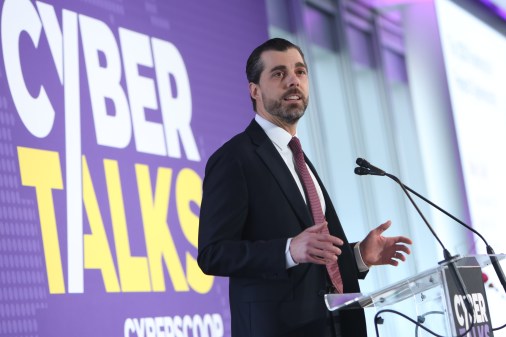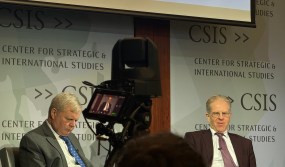Aaron Snow sees bright future for evolving 18F

The General Services Administration’s 18F is going to be around for a long time — at least that’s what former Executive Director Aaron Snow, who stepped down from his position Thursday, believes.
Seen as pet projects of tech-friendly President Barack Obama, digital service teams like 18F and its White House counterpart, the U.S. Digital Service, are entering a new administration with uncertainty in what the future holds for them.
But Snow, who is taking a short leave of absence from 18F and GSA’s Technology Transformation Service to pursue an opportunity outside of government, doesn’t really see it that way.
[Read more: Aaron Snow stepping down as 18F director]
“What we do is not Democrat or Republican,” he told FedScoop days before he bid a temporary goodbye to 18F. “What we do is we help government spend taxpayer dollars wisely. We help government deliver services that government is intended to deliver better, faster, cheaper.”
Snow added: “It seems clear there is support for what we do from all sides, all points on the political spectrum. I don’t think that a change in administration substantially changes what we do, how we do it or the scale of impact we can have.”
Formed by a handful of former Presidential Innovation Fellows — one of whom was Snow — in March 2014, 18F was meant to be a radical experiment to bring private sector best practices in web development into the risk averse federal government.
“We were given the latitude and air coverage to engage in this ongoing series of experiments about how to improve how government delivers services digitally to the public,” Snow said.
The intent was to show a “very risk averse … low-reward, high-risk” government that modern software development methodologies could work in a bureaucracy.
“There’s a great deal of anxiety and fear around trying new things, trying different methods and approaches, when nobody gets in too much trouble for doing the same thing as before even if the same thing isn’t working all that well,” Snow said. “The air cover not only allowed us to experiment, but it allowed us to sort of put ourselves on the line on behalf of other agencies, to be that first mover who can take those risks and then demonstrate success with them. And that’s how you create change. That’s how you remove anxiety and the stress of doing something a different way.”
But that evolved into something much bigger.
“It started with this one notion that a group of us could form small teams and help a few agencies deliver web services,” he said. “And it quickly sort of spun into several more experiments in consulting and web services and platform services and education and in transformation and in recruitment as a service.”
Along that evolution, those on the outside got a little lost on exactly what 18F’s purpose was and became concerned the team might be competing with the private sector in providing digital services to agencies. That concern was highlighted by representatives of technology industry trade groups at a House Oversight and Government Reform hearing in June.
And perhaps 18F hadn’t done a good enough job of explaining its intent and envisioned impact, Phaedra Chrousos, who was then commissioner of the newly formed TTS, said during her testimony.
[Read more: Lawmakers crave transparency from USDS, 18F digital teams]
Snow agrees and said that since then, 18F has made tremendous progress communicating its vision to be a partner — not a competitor — to industry.
“We’re super excited about partnering with the private sector to make this work,” he said. “This doesn’t work with just some people on the inside, and it doesn’t work with just the vendor community and nobody on the inside to interact with them. It’s going to work when we’re doing it together. And I think we didn’t do a good job of communicating that evolution over time. But I think we’re there now.”
Another issue brought to light in a Government Accountability Office report prepared for that hearing was 18F’s finances. The team appeared to be hemorrhaging money and wasn’t projected to see a year of positive financials until 2019. Despite operating like a startup and being constantly compared to one, 18F alarmed the public with those figures.
As Snow steps away, though, he suggests 18F’s long-term impact is about more than money — particularly those things that are “intangible.”
“The measure of 18F’s value is not just the dollars saved on the projects we’re working on right now with an agency any more than the measure of its value is the number of dollars it makes or loses,” he said. “The measure of its value is how much we help agencies evolve how they think about the delivery of digital services in government across all of their work.”
“And I don’t think anybody has done a fantastic job yet of measuring the success of the intangibles that we are ultimately after,” he added.
This is something he’ll pay close attention to when he returns to 18F sometime in November but in a different capacity — as an adviser to the not-yet-named commissioner of TTS.
“My intention is to help that person find their sea legs and help make sure that 18F and TTS are positioned to continue to succeed and to have the support that they need from GSA and from the incoming administration and from the Hill — to help that person have a vision for the next steps and then how to execute that on the ground,” he said.
Though he won’t have the same impact directly on 18F as he did while executive director, Snow has faith in the team of more than 200 he leaves behind.
“This thing is in incredibly good hands,” he said. “The people who have come to join this thing are incredibly creative and dedicated and generous and talented and mission-driven. And nothing has stopped them yet.”






